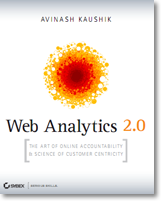 I recently had the privilege of doing an interview with James Maguire of ecommerce-guide.com. The overall scope of the interview was to talk about what do small and mid-sized businesses need to do in order to extract value from their web analytics implementations. The goal was to provide recommendations and tips on specific reports and touch on the “hot” area of Search.
I recently had the privilege of doing an interview with James Maguire of ecommerce-guide.com. The overall scope of the interview was to talk about what do small and mid-sized businesses need to do in order to extract value from their web analytics implementations. The goal was to provide recommendations and tips on specific reports and touch on the “hot” area of Search.
You can find the complete interview on the ecommerce-guide website: How to Use Web Analytics, Part 1. It is a brisk ten minute read, I recommend it (of course you expect me to say that about my own interview!!).
Here is a summary of the interview (but not too many details, don’t want to steal the thunder from James).
Overall Theme:
- Web Analytics is very hard for all of us. Start simple, start free, focus on “Inputs” and “Outputs” in terms of initial reporting efforts and fall in love with SEO.
Getting Started:
- You don’t have to buy expensive software to start your web analytics efforts. With the complexity of high end packages it pays to learn first using some of the free packages. ClickTracks Appetizer for log file parsing, Google Analytics for Javascript tags (whatever works best for each SMB). Implement free, dive into data, learn through grunt work and move up the food chain to the expensive packages if these are limiting or as your sophistication grows.
[UPDATE: ClickTracks Appetizer is no longer available. There are many web log parsers available, please do a quick Google search. Alternatively you can start with the lite version of WebLog Expert.]
Omniture, WebTrends, HBX, CoreMetrics etc are all great packages but I recommend the path above so you will make more intelligent decisions, apply the 10 / 90 rule and extract maximum value.
- Don’t open your new package and dive in and get distracted. First figure out your desired outcomes. Why does your website exist? What are the goals of your website? Once you have your goals only focus on reports, initially, that will help you understand the website behavior that is tied to those goals/outcomes.
Six Initial Reports I Recommend (to avoid death by data):
- Top Key Phrases from Search Engines. Search is the game baby, and even more so for our SMB friends who have very small ad budgets and have to leverage the power of search engines. Do this to infer intent of your customers, do this to know if you are getting the traffic you think you deserve. If you are not take action.
- Top Referring URL’s. Taking the above recommendation to the next level. Many SMB’s create partnerships with other SMB’s or associations etc. As you look at the referring URL’s do you see any that are interesting and surprising? Do you have some relationships with them? If not should you? Then, my favorite, segment out those referring url’s that are sending you traffic that meets your goal criteria (a order, a lead, a particular page view etc).
- Site Content Popularity: Websites are small and websites are big. Do you know what content is being consumed the most by your visitors? It is probably less than 20%, it is important to know which 20%. In my experience we are always surprised by what content is being consumed by our customers, specially if you segment out content consumed by those who meet your site goals. Start with most popular pages viewed on the site, go from there.
- % of Visitors Who Visit the Home Page: This recommendation is more a reaction to the fact that 90% of website owners are way to enamoured by the home page and perfecting it. In reality around half or less of the site traffic sees the home page. Do you know what this number is for you? Knowing this will mean you can assign resources optimally, focus on other pages, if you have “golden content / promotions” you won’t just show it on the home page.
- Click Density / Site Overlay: It takes a lot to interpret the Click Density report but there is nothing simpler for a SMB owner to start with. Web Analytics comes to life, they can “see” the clicks and relate to visitors in a new and more profound way. Click Density’s real power comes when you look at segmented click density, where do purchasers click vs everyone else. Actionable insights. For a SMB owner, if you see “interesting” click density behavior do simple experiments with layout, content, navigation to optimize.
- Site Bounce Rate: I define this as visitors who stay on the site for less than 10 seconds (or one page only, though for reasons I’ll blog about some day I prefer the 10 seconds). Specially for a SMB owner who has precious few resources to spare each visitor is valuable and it is hyper critical to know what this number is (and then segment by campaigns, referring urls, top paged on site with high bounce rate etc to know who is sending you valuable traffic).
Search Engine Optimization & PPC Point of View:
For better or for worse Search dominates our lives. A start to effective search strategy is to know if you are optimized for the right key phrases, and all aspects of that:
- Do you know what the most important key phrases are for you (both brand and category, for a SMB category becomes even more important)?
- Are you showing up in search engines?
- Do you have the right meta tags?
- Do you have the right content with the right key phrases?
Something like HitWise is quite expensive for SMB’s but there are options like the Overture Keyword Selector Tool or the options at MSN adCenter Labs or a very cost effective option such as Wordtracker (one year subscription for $255). Or my cheeky suggestion, go to your direct competitors pages and look for the meta tags by doing a View Source.
In terms of Search Engine Optimization (SEO) and Pay Per Click (PPC) I am quite biased towards a solid SEO strategy first, otherwise you are just renting traffic that will come only as long as you spend money.
I also recommend using a service like XML-Sitemaps to create your site maps and uploading those into Google to get a higher chance that Google will index all your content effectively. XML-Sitemaps is free, Google also does not charge anything to upload so something quick that can be helpful.
So this was longer than I expected to blog about. : ) The interview article is much longer so if you want greater detail and ideas please click here to read it.
There is some high praise for James in this blog post Can’t Live Without Web Analytics for the interview. Check it out if you have a second, I don’t think you can resist a blog post with that title!
Please share your feedback on this blog post / interview. Would you have made the same recommendations for important reports? Are there others that a SMB owner would find more useful? Do you recommend other strategies? Please comment.
[Like this post? For more posts like this please click here.]





 Via
Via 














Great interview, and not just for small businesses. Even big companies don't know what to do and would be better to start with your short list.
It is interesting that you did not say standard metrics like "conversion rate" which is primary recommendation of the KPI approach. Jumping directly to KPI's is probably what distracts most "analysts" from doing some of the basic things identified in the article (basic but really critical).
All in all a nice complete article about how to approach web analytics and web acquisition strategy (with your recommendations on SEO).
Hi Avinash,
Thanks for another helpful post! (which I am going to take directly to my clients). I wanted to mention a couple questions/thoughts in response to your comments:
– I'm wondering why you suggest Hitwise & the YSM keyword selector tool, but not Wordtracker? Wordtracker does offer short-term subscriptions that are pretty cheap. Just curious if there's something I'm missing…
– When you mention organic vs. PPC, you are of course right on the ball in terms of organic delivering more results in the long-term (sans long-term advertising budget). However, PPC is growing & growing because it provides such a straightforward conversion tracking opportunity! My hope is that free options like Google Analytics will bring some of that accountability back to the organic side.
– As an aside, I love to use PPC as a research tool for an organic campaign. PPC allows speed and ease-of-control so that you can get some quick information on how keywords might perform in organic results, before you make a big labor investment in reworking your content for chosen terms. Using your #2 analytic with organic results is doing the same thing, but might not provide as much opportunity for testing a variety of terms. Or were you thinking that this would include PPC traffic?
best regards (look for my book in the mail!)
-Gradiva
http://www.yourseoplan.com/
Gradiva: No you are not missing anything, it was my oversight on Wordtracker. It would indeed be perfect for SMB's (I have edited the blog post to add it in now).
Your suggestions of PPC usage are both good and I agree with them. Think of my stress on SEO coming from two reasons:
1) For SMB's ppc is a very complex activity and it can get very expensive very quickly. Hence in the actual interview I suggested that immerse yourself in SEO, you are building for the long term, but also read up on SEM (I had recommended Bill Hunt's book) and then get into it.
2) Almost everyone I know (and maybe I am hanging with the wrong crowd) is doing SEM in a very sub optimal fashion. Often because you blow money and people show up. So think of me a small little voice trying to counter-balance this massive imbalance against SEO and for SEM. : )
Your suggestion of using PPC to test for Organic term performance is a excellent one.
I am looking forward to reading the book. Thanks so much for that and for your thoughtful comments, it adds so much value to my original post.
Hi Avinash,
Meant to comment earlier on your excellent post on Small Business Web Analytics. Every one of the reports you mention is very helpful – and most packages will provide the six initial reports in some form or another.
I don't understand my clients' business like they do (and in a Small Business your client is sometimes the person who created the business). Most of the time, they don't know Web Analytics (or maybe they think they know a little bit – and those clients can be more work, actually) – and what they really want is intelligence – they want to know Why something works/doesn't.
Also, most of the time, everyone wants free traffic from Search Engines – and while it's always easy to get ranking for 3,4,5 work queries (there's much less competition and much more relevance to your specific content) it's much, much harder to do well on a one or two word query.
Take one of the hardest queries to rank well on …"Water". Do you think even Perrier could rank well for that? (http://www.google.com/search?hl=en&q=water) There are 1.46 Billion pages in Google's index for that word.
Some of my clients were/are intrested in "house plans", "home plans", "floor plans" as the main keywords – and one of my clients was in postion 8/9/10 for a time for "house plans" and 5 for floor plans. When they dropped from postion 9/10 to postion 12/13/14 – they lost 100 visits a day (judging from LiveStats.NET analytics).
But I'd look at it the other way – the client briefly gained 100 visits a day they would not have had because of the first page listing. My point being that every small business owner would like to be #1 or at least on the first page of results – but usually don't want to change anything about the site and once being on the first page – don't keep up the SEO.
And as a friend and mentor of mine, Bill Hunt, brought up to me a couple of years ago – when you're on the top, everyone tries to take you out-your a target for all your competitors. ONce your on the top of search results – you need a plan to stay on top and to defend your position – all of this is usually beyound what SMB clients are willing to do.
So, Web Analytics really should do the next best thing – the best thing really, focus on helping to make the site better by observing Visitor Intent and improving to the site – which, by the way, also helps with Search Engine Visibility and…Viral Marketing.
I think I need some education here. I'm confused by the reference to click density and site overlay reports. Are they the same thing? I thought that site overlay was like the WebTrends SmartView reports where you can roll over a link and see some activity statistics on that link. I understood click density to be a report that shows where people click on a page. It does this whether it is a valid link or not. Which (or both) kinds of reporting were you referring to? Do I have it all wrong?
Also, thanks much for the great content. I love this blog. You are doing a fantastic job. I know it must be a lot of work.
I wait until Friday afternoon to read as it is my weekly reward. :)
Kathy: Let me first allay any confusion that they are both different names for the same thing, but Site Overlay / SmartView want to be Click Density but they are really not the way they are implemented.
So what is "Click Density"? It is the ability of any web analytics tool to efficiently show where people click (as a percent of page views) on the web page. It looks like this in a good tool:
At a glance you know exactly which links are more "interesting / important / relevant" to your customers. This is what I was referring in the post, this report is a great way even for a novice to understand what is going on on the web page. No need to hover mouse, no need to think too hard.
But it gets better in a good tool.
Now I have gone in and created a quick segmentation of my most interesting traffic, from Search Engines. What you see below, on the same Click Density report, what is interesting / important / relevant to Search Engine traffic as compared to All Visitors.
Now this gets fun (ok I am a geek : )) because turns our Search Engine traffic is more interested in different links than All Visitors. Imagine the optimization of pages you could do if you could only understand to this level how different segments of traffic react to links on your pages.
You can begin to create a website that is optimized to people who are meeting the objectives you have set for your website.
Hope this helps.
-Avinash.
PS: Sorry for the delay in replying I was on vacation and I needed access to my blog clicktracks data to use in the examples above.
Hi Avinash,
Thanks for another helpful post!
nice post
your tips is very useful
thanks
Since you prominently mention ClickTracks Appetizer in your book "Web Analytics: An Hour A Day", you might want to mention that ClickTracks (now part of Lyris) no longer serves "appetizers" except in the form of 14 day free trials. Too bad.
By the way, I'm enjoying that book, looking forward to reading the new one, and appreciate your quick response to my tweet about social conservatives.
Since you prominently mention ClickTracks Appetizer in your book "Web Analytics: An Hour A Day", you might want to mention that ClickTracks (now part of Lyris) no longer serves "appetizers" except in the form of 14 day free trials. Too bad.
Ozgur: It is sad that Appetizer disappeared. But in the blogpost above I've linked to Weblog Expert which is free and might be one good option.
This post is from mid-2006. The wonderful thing is that the world is now full of really really good free tools that you can get going in just a few minutes. Google Analytics and Yahoo! Web Analytics are two obvious choices you can get going with, without having to go down the Appetizer or Weblog Expert path.
All the best!
Avinash.
Sadly, content has been removed from the ecommerce-guide.com page. The link now redirects to a standard page. Too bad.
Great article as always, Avinash, and still relevant!